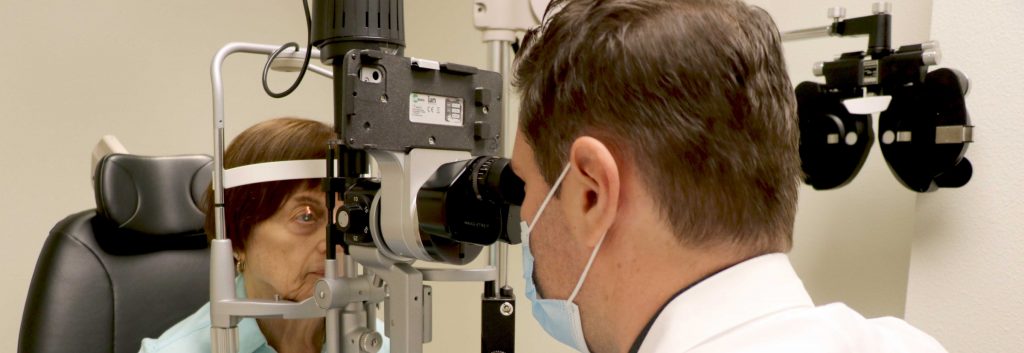The Clinical Eye Research Unit (CERU) at the University of Wisconsin–Madison Department of Ophthalmology and Visual Sciences has been instrumental in the approval of a new treatment option for patients with exudative age-related macular degeneration (wet AMD).
AMD is the leading cause of vision loss for older adults. While it doesn’t result in complete blindness, it does cause wavy or blurry central vision, making it harder to see faces, read, drive, or do close-up work. There are two types of AMD: wet and dry. Most people with AMD have the dry type, which is a thinning of the macula (the central portion of the retina responsible for central vision and color perception) and is often associated with slowly progressive vision loss. Wet AMD can lead to rapid vision loss and occurs when abnormal blood vessels grow and leak in the macula, often causing swelling and blurry vision.
The CERU has been participating in a two-year pivotal trial sponsored by Bayer Pharmaceuticals that evaluated the long-term safety and effectiveness of a new treatment for wet AMD utilizing high dose aflibercept (8 milligrams). The study involved injecting the medication directly into the vitreous cavity – a gel-filled compartment in the back of the eye. Participants were randomized into one of three treatment groups and received either aflibercept 8 milligrams every 12 weeks, aflibercept 8 milligrams every 16 weeks, or aflibercept 2 milligrams (also known as Eylea, the injectable originally approved by the FDA in2011) every 8 weeks, after 3 initial treatments every 4 weeks.
Based on the positive trial results, the aflibercept 8mg (commercially known as Eylea HD) was approved by the U.S. Food and Drug Administration (FDA) for wet AMD (as well as for diabetic retinopathy and diabetic macular edema) in August. It usually takes several months before the medication starts reaching doctors’ offices, and it requires careful tailoring to individual patient circumstances and needs before actual use.
“The FDA approval of high dose aflibercept is a significant advancement in the care and treatment of retinal disease,” said Mihai Mititelu, MD, MPH, FASRS, Principal Investigator of the trial at UW and Medical Director of the Clinical Eye Research Unit. “The new treatment protocol builds upon the previously established efficacy and safety profile of aflibercept 2 milligrams by demonstrating the ability of the high dose agent to allow patients to maintain vision at extended dosing intervals. Results from this landmark clinical trial demonstrate that patients with wet age-related macular degeneration can now safely receive less frequent injections and still experience similar visual improvements,” added Dr. Mititelu.
“Eylea HD represents a new and important tool that retina specialists can utilize in their fight to save vision for patients suffering from sight-threatening retinal disease such as wet AMD,” adds Dr. Mititelu. “Patients with retinal diseases should discuss this new treatment option with their retinal specialist.”
“Like with any newly approved medications, careful attention to the applicability of clinical trial data to real-world conditions is important,” Mititelu added, “as is the necessity of physicians to remain vigilant and knowledgeable of the side-effect profile as they start to incorporate this agent in routine clinical practice.”
Following the encouraging results of the wet AMD study, Bayer recently launched a second clinical trial involving high-dose aflibercept, this time for retinal vein occlusion, another sight-threatening retinal condition associated with leakage of fluid into the macula. The CERU is a participating site in this clinical trial. “As is the case with targeting wet AMD, aflibercept is already approved as a treatment option for retinal vein occlusion at the 2-milligram dose,” said Dr. Mititelu. “We are looking at the efficacy and safety of the 8-milligram dose given less frequently. If the results are favorable, as they were with AMD, and if the agent gains FDA approval, retinal specialists will be able to offer this less frequent treatment option to patients with retinal vein occlusion.”
